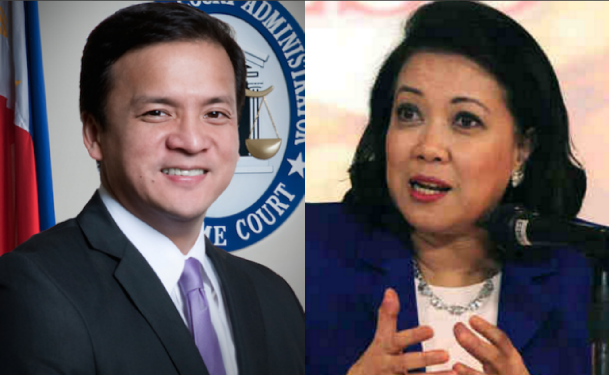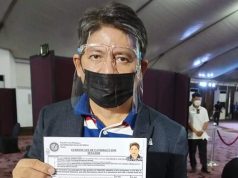
(UPDATE – 5:10 p.m.) MANILA, Philippines — Court Administrator Jose Midas Marquez alleged that the Supreme Court, under Chief Justice Maria Lourdes Sereno’s watch, failed to act upon any application of spouses of deceased judges and justices for survivorship benefits from October 2015 to November 6, 2017.
Also, Marquez, who was among the resource persons in the House Committee on Justice’s hearing on the impeachment complaint against Sereno, said that he didn’t get any reply from the chief justice when he wrote her in January 2017, recommending urgent action on the claims of the aging spouses of the late magistrates.
Marquez shared the information with the committee chaired by Oriental Mindoro Rep. Reynaldo Umali after lawyer Lorenzo Gadon accused Sereno of committing impeachable offenses, including allegedly delaying the release of survivor benefits, until widows of judges and justices grow old, get sick, and die of waiting for financial assistance, among them was 94-year-old Dolores Colayco, widow of a Court of Appeals justice.
During the hearing, Marquez narrated that he had received requests to expedite the resolution of applications for survivorship benefits from October to December 2016, such as one from a friend of the 94-year-old Colayco.
He said Colayco’s friend sent him seven text exchanges from November 2, 2016 to December 16, 2017 to follow up on the application of the aging widow, who needed the benefits for her living and medication expenses.
This prompted Marquez to write a letter to Sereno on January 12, 2017, informing the chief justice that from 2010 to September 2015, the high court approved 271 applications for survivorship pension of spouses of judges who retired or died before the effectivity of Republic Act 9946 on February 11, 2010.
This law states that upon the death of a justice or a judge, his or her surviving spouse will be entitled to receive all the retirement benefits that deceased would have received if he or she had not died. The law says that the spouse will continue to receive it until his/her death or remarriage.
Continuing to cite from his letter, Marquez said that since it had been more than a year since the Supreme Court’s last action on pending applications for survivorship pension, and since majority of the spouses are beyond 80 years old (their ages ranged from 79 to 98 years old), there was a compelling need to expedite the actions on 29 of the applications.
As most of them were in poor health, they might not be able to avail themselves of the benefits due them, which was why Marquez said he recommended that the high tribunal treat the matter urgently and make a definitive ruling on it.
‘Walang nangyari’
But Marquez said his letter allegedly fell on deaf ears, “Wala pong nangyari doon eh, wala pong sagot (Nothing happened to it, there was no reply).”
Marquez said that before, if a surviving spouse wanted to have survivorship benefits, he or she would just have to go to the Office of the Court Administrator and file an application, which would then be studied by an office whose only job was to receive these applications.
Once the requirements were complete, the Office of the Court Administrator would then recommend whether to grant or deny the application, which would then be submitted to the Office of the Clerk of Court en banc.
However, this is no longer the case now, according to Marquez.
R.A. 9946’s retroactivity clause, which states that “The benefits under this Act shall be granted to all those who have retired prior to the effectivity of this act,” caused conflict.
Were the spouses of the justices or judges who died before Febuary 11, 2010, the date of effectivity of RA 9946, still entitled to survivorship benefits?
Marquez explained that in the 271 applications, the Supreme Court said yes — affirming that the spouses would still receive benefits. However, they would receive survivorship benefits not from the time their spouses died, but from the time that the law took effect.
But there was an “opposite view” in the Supreme Court that said that the spouses of the judges and justices who died before 2010, would no longer be entitled to survivorship benefits, according to Marquez.
Because of the conflicting views, the Special Committee on Retirement and Civil Service Benefits, composed of two technical working groups (“TWG to screen applications” and “legal TWG”) was created in an order signed by Sereno, Justice Antonio Carpio, and Justice Presbitero Velasco.
As a result, “all applications received by the Office of the Clerk of Court en banc beginning October 2015 were held in abeyance,” Marquez said.
‘No intention to delay but CJ doesn’t decide alone on applications for survivorship benefits’
In an e-mailed statement, Sereno’s spokespersons said that the chief justice “did not intentionally delay action on petitions for retirement and/or survivorship benefits, which applications are in the first place required to be decided by the Supreme Court as a collegial body.”
They further explained that, “The Chief Justice is sympathetic with the plight not just of retirees in the Judiciary, but of the people, who long for an expeditious resolution of their cases. To this end, she has even instituted measures to rationalize and expedite the very process respecting retirement benefits that Complainant assails.”
As to whether the Special Committee was more efficient, Atty. Josalee Deinla, one of the spokespersons, said in an interview that, “Mahalagang maunawaan na ‘tin na nagkakaroon ng bagal, may bara hindi dahil sa malisya o may pinag-iinitan ‘yong mga justice ng SC, kundi may mga bagay na kailangan munang resolbahin.”
[It’s important for us to understand that there is a slowdown, there is a choke point, not because of malice or because the SC justices are ganging up on anyone, but because there are things that need to be resolved first.]
“May policy decision na kailangan munang pagdesisyunan ang SC en banc at may pending administrative cases ‘yong mga justices and judges na kailangan ng final decision,” she said.
[There is a policy decision that the SC en banc should decide on first, and there are pending administrative cases of the justices and judges that need a final decision.]
Deinla added, “Ang desisyon patungkol sa application ng retirement benefits ay hindi ginagawa ni CJ alone, SC en banc ang nagdedesisyon [The decision regarding the application of retirement benefits aren’t done by the CJ alone, but it is the SC en banc that decides on it].”
Marquez himself acknowledged that the decisions on retirement benefits are decided not by the chief justice alone, but by the Supreme Court en banc.
Asked by Antipolo City 2nd District Romeo Acop if the decisions on issues of retirement benefits by the Special Committee are decided by the chief justice alone or the Supreme Court en banc, Marquez replied, “Court en banc po. The committee cannot decide. The committee can only recommend.”
As to whether the Supreme Court has any rule that governs the period wherein applications for benefits must be resolved, Marquez said he could only think of the provision in the 1987 Constitution which gives the Supreme Court 24 months to resolve cases filed before it.









